#COVID-19 studies
Text
CW: COVID-19
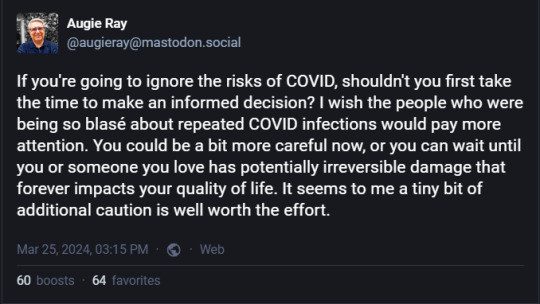
via @[email protected]
Yes, I wish the general public takes COVID more seriously.
Coronavirus is not like the flu nor RSV and we've known about that since MERS and the first SARS. Also, massively disappointed with queer assimilationists since COVID is quite similar to HIV/AIDS and given how the government's eugenicist policies and their anti-LGBT campaigns wiped out many of the people who would have been elders in our communities today. Let's alone the deaf communities with the older generations of sign language folks becoming deaf and multi-disabled because of rubella, which is much more infectious than COVID.
I encourage you to read what Augie has to say since the screenshot is a snapshot of a five-parts thread.
Here is the spreadsheet where Augie took the time to read over 1 500 studies and summarized the findings of about 500 of them: https://docs.google.com/spreadsheets/d/12VbMkvqUF9eSggJsdsFEjKs5x0ABxQJi5tvfzJIDd3U/
#COVD#COVID studies#COVID reports#COVID resources#COVID-19#COVID-19 studies#COVID-19 reports#COVID-19 resources#SARS-CoV-2#SARS-CoV-2 studies#SARS-CoV-2 reports#SARS-CoV-2 resources#SARS#coronavirus#coronavirus pandemic#pandemic is not over#COVID is not over#mask up#wear a mask#clean air for all#clean air revolution#we keep us safe#informed consent#community defense#community defence#COVID precautions#COVID conscious
8 notes
·
View notes
Text
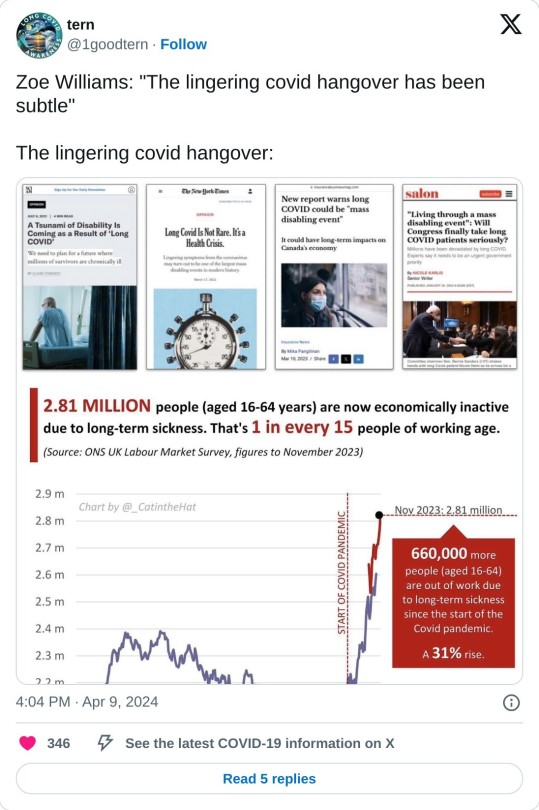
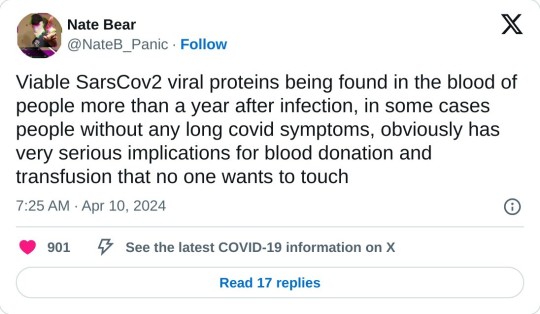
#current events#current news#covid#long covid#covid 19#covid isn't over#covid conscious#pandemic#wear a mask#mask up#science#medicine#healthcare#medical industry#medical study#global news
123 notes
·
View notes
Text
idk if this is like a whole phenomenon borne out of like time elapsing since 2020/2021 or if I’m just like. overthinking it but more and more people around me are opening up about sneaking people into their dorms in 2020 or partying in the college park at night in 2020. I thought we all took at least 2020 mandates seriously????
#brother I am losing my fucking marbles#covid#covid 19#anyways to the girl I saw wearing a mask and studying I love you sm
29 notes
·
View notes
Text
About 16 million people in the United States have Long Covid, a poorly understood disorder that causes body aches, headaches, fatigue, insomnia, brain fog and other symptoms long after an initial infection with COVID-19. For some, the symptoms are mild, but for other they are so severe they become disabling.
Why do some people quickly recover from Covid, while about one in five have lingering symptoms?
A new animal study found that thousands of genes involved in nervous system function are affected by SARS-CoV-2, and may cause lasting damage to dorsal root ganglia, the spinal nerves that carry pain and other sensory messages to the brain. Scientists believe that genetic damage may be what causes Long Covid.
“Several studies have found that a high proportion of Long Covid patients suffer from abnormal perception of touch, pressure, temperature, pain or tingling throughout the body. Our work suggests that SARS-CoV-2 might induce lasting pain in a rather unique way, emphasizing the need for therapeutics that target molecular pathways specific to this virus,” explains co-author Venetia Zachariou, PhD, chair of pharmacology, physiology & biophysics at Boston University’s Chobanian & Avedisian School of Medicine. (Read more at link)
123 notes
·
View notes
Text
Hello! I'm here to bring you your breaking medical news from Twitter!
(No lie: I'm sure it depends who you're following, but I get really clear and specific COVID-19 info there.)
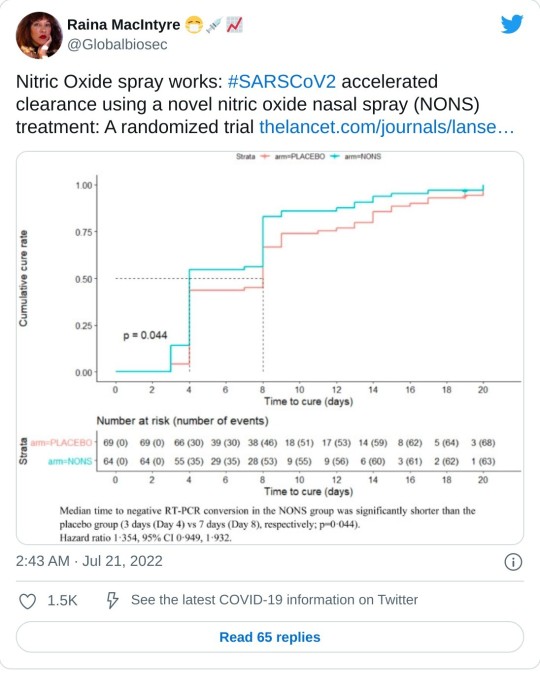
In this peer-reviewed, randomized, double-blind, multicentre, parallel group, placebo-controlled phase III clinical trial (which you KNOW I read through before sharing!), people with COVID-19 tested negative much sooner when using nitric oxide nasal spray.
It reduced the virus in their noses, which makes it less contagious AND means the patients get less sick.
(It specifically mentioned symptoms ending sooner, and it looked like a fair number of people on placebo were still having symptoms after 2½ weeks. I really hope that means it will significantly reduce the risk of long COVID, but of course it'll take months to find out for sure.)
And it apparently works on all (or just lots?) of airborne viruses.
More trials are apparently on the way, but you can buy these sprays over the counter - at least online.
464 notes
·
View notes
Text
The lockdown was difficult because it did not allow me to grow mentally.
My mind is still stuck at 8th grade where I could get 2nd or 3rd position without trying and putting efforts just by studying the night before. But now I'm giving my final exams at 12th grade my brain doesn't know how to put efforts and just procrastinates and i regret everything and have a panic attack the night before. And it will be disastrous once i get to college.
I think i need professional help because everyday my anxiety is getting worse and my friend had to calm me down from attacks through whatsapp.
Can anyone please give me some advice
#academics#send help#please help#help#studyblr#student life#lockdown#mental health#anxienty#anxi4ty#anxeity#anxitey#studying#study motivation#covid#covid 19#collage#high school#exams#cbse board#academic validation#mentally fucked
9 notes
·
View notes
Text
Scientists at Washington University in St. Louis have developed a breath test that quickly identifies those who are infected with the virus that causes COVID-19. The device requires only one or two breaths and provides results in less than a minute.
The study is available online in the journal ACS Sensors. The same group of researchers recently published a paper in the journal Nature Communications about an air monitor they had built to detect airborne SARS-CoV-2 — the virus that causes COVID-19 — within about five minutes in hospitals, schools and other public places.
The new study is about a breath test that could become a tool for use in doctors’ offices to quickly diagnose people infected with the virus. If and when new strains of COVID-19 or other airborne pathogenic diseases arise, such devices also could be used to screen people at public events. The researchers said the breath test also has potential to help prevent outbreaks in situations where many people live or interact in close quarters — for example aboard ships, in nursing homes, in residence halls at colleges and universities or on military bases.
“With this test, there are no nasal swabs and no waiting 15 minutes for results, as with home tests,” said co-corresponding author Rajan K. Chakrabarty, PhD, the Harold D. Jolley Career Development Associate Professor of Energy, Environment & Chemical Engineering at the McKelvey School of Engineering. “A person simply blows into a tube in the device, and an electrochemical biosensor detects whether the virus is there. Results are available in about a minute.”
14 notes
·
View notes
Text
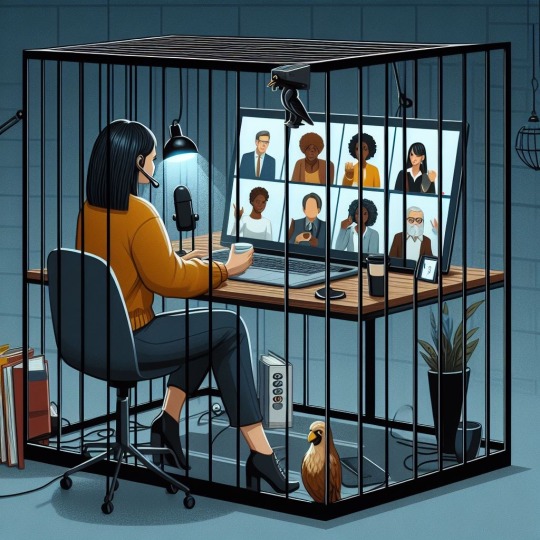
Time to bring humanity back to the classroom
COVID 19 has had a profound effect. It really goes without saying. But I am not talking about the heart-shattering loss of life or the cabin fever inducing 3 years we spent locked in our homes. I am talking about the way business is conducted and how foreign language training has evolved here in Japan. With an increased acceptance of video meeting software such as Zoom, Teams or Meet, the classroom shifted into the virtual world as well.
Companies were forced to move the office to people's homes while the pandemic raged and after companies grew to accept that style, many have stuck to Work From Home. Nikkei Asia estimates that nearly 40% of workers are still doing a hybrid style of work (link), saving transportation and even electricity costs for businesses. This shift to video meetings also impacts on the number of business trips as communication can be achieved for a fraction of the cost. This research positively talks about how 64% of companies still find business travel important, but that means that 36% don't.
Of course, what I am leading up to here is that this has impacted the general attitude towards studying foreign languages, particularly English. More private students or companies are turning to more reasonably costing online English training meaning there has been a step back from the beneficial environment of face-to-face English lessons. Aside from the obvious lack of technical issues that sometimes crop up, there are many benefits to a more intimate training environment. A teacher can have quicker reaction times to questions or problems and has a better capability of reading learners' body language. There is a better sense of connection between all members when you are in a live environment, with more live tools at the teacher's disposal. Last, but not least, there are less chances of succumbing to distractions such as pets, children or that temptation to turn the TV on. This website also talks about motivation and focus as a couple of benefits of being in a classroom as some other potential benefits.
Companies offering English training need to embrace a commitment to quality lessons with practical contents set up in a way that is enjoyable for the students. And most importantly, we need to bring the humanity back to the English study environment and get back in the same room. The teacher needs to work closely with the students to help them realize their goals and use all the tools and signs at their disposal. This is at the heart of what Lowrey Global Consultants strives to do.
#japan#language#training#efl#English study#globalization#global#studying#online#classroom#face-to-face#international#covid 19#Coronavirus#post pandemic
2 notes
·
View notes
Text
My comment: I really want everyone who thinks of themself as healthy or normal, and has no pre-existing conditions (and therefore think you are safer than disabled people) to understand: you are one mild COVID infection away from becoming disabled to the point of losing your career. ‘Learning to live with COVID’ is not ‘returning to normal’. It is sentencing millions of previously healthy people to a lifetime of chronic illness, in a country where disabled people are more than twice as likely to live in poverty. This is ruining lives, and it’s not slowing down.
Quotes, bold text is my addition:
“people with mild or moderate initial coronavirus infections — who make up the vast majority of coronavirus patients — can still experience debilitating post-Covid symptoms including breathing problems, extreme fatigue and cognitive and memory issues.”
“the study covered only the first four months after the diagnostic code was introduced and did not include people covered by government health programs like Medicaid or Medicare (though it did include people in private Medicare Advantage plans). “That’s probably a drop in the ocean compared to what the real number is,” Dr. Steves said.”
…”while two-thirds of the patients had pre-existing health conditions in their medical records, nearly a third did not, a much larger percentage than Dr. Ssentongo said he would have expected. “These are people who have been healthy and they’re like, ‘Guys, something is not right with me,’” he said.”
“The findings suggest a potentially staggering impact of long Covid on people in the prime of their lives, and on society at large.”
“More than three-quarters of the patients in the study were infected in 2021, most of those in the last half of the year.”
“the scores suggested that the repercussions of long Covid are not simply confined to increased medical spending. They signal “how many people are leaving their jobs, how many are being given disability status, how much absenteeism is there in school,” Ms. Gelburd said.”
#in a culture where work is so central to identity and an economic system where work determines survival - how can anyone be cavalier about#a growing threat to your ability to work at all??#do you know how scary and demoralizing it is to lose your health? lose your ability to think? to stay awake all day? to enjoy life??#covid 19#coronavirus#nyt#studies#long covid#United states#I think if everyone actually understood what they were risking they wouldn’t be so careless. they’d realize why temporary inconvenience#isn’t even a sacrifice if it preserves your lifelong ability to work
20 notes
·
View notes
Text
#The Risks of Even Mild COVID-19: 1 in 4 Showing Cognitive Deficits After Mild Case Brazilian Study Finds#Brain Facts#Alphabet Soup#Tumblr Staff Has Ruined Links Now And I Hate Them For It#Bookshelf
1 note
·
View note
Photo

The expression of Deng Lun's eyes and the composition made me draw it.
I took a frame from this video 8:15m:
https://www.youtube.com/watch?v=tvB_CQQrFRI
6 notes
·
View notes
Text
#covid 19#long covid#also posting this article as it does a good job breaking down the nature study#and rightfully calls out the absolute shitshow that has been the handling of this pandemic
5 notes
·
View notes
Text
Good lord the Medieval Academy of America just sent out an email asking specifically female members to consider submitting to Speculum.
'Before the pandemic, roughly equal numbers of female and male medievalists offered articles to Speculum. However, from the onset of the COVID crisis in March 2020 through the end of 2021, a disturbing gender imbalance emerged. As Editor Katherine L. Jansen recently reported at the annual meeting, of the articles submitted over those twenty-two pandemic months, "only 90 (39%) were from women, while 143 (61%) were from men, revealing a gender disparity of almost 59%." While the reasons for this disparity are complex, it seems reasonable to speculate that women medievalists, like career women more generally, have had their ability to work negatively affected by the pandemic, and in particular by care-giving duties.'
#medieval studies#academia#covid 19#i don't even have a clear idea of what my reaction to this is rn im just having one#also they did ask about how to better support women scholars so this isn't just a 'do more labor!! give us articles!!'#jam posts
7 notes
·
View notes
Text

24.06.22 | 1/10 days of productivity
Hello,
I’ve been a while away from here, but I always come back :D
Right now I’m isolated due to covid (only mild symptoms) and I thought “why don’t I start a productivity challenge with myself to motivate me?”.
So my goal to today is:
• answer 40 questions (practicing for residency test)
• 10min of reading
• practice French
And of course I’m eating a snack to keep me energized for these tasks! 💪🏻
Stay safe!
🎧My universe - BTS ft Coldplay
#studyblr brazil#studentlife#studyblr#inspiration#motivation#medicine#med studyblr#grateful#study inspo#everyday life#coffee#coffeeaddict#spotify#covidー19#isolamento#productivity#10 days of productivity#gloomstudy#stillstudies
3 notes
·
View notes
Text
https://www.washingtonpost.com/health/2022/08/19/long-covid-brain-effects/
New study suggests covid increases risks of brain disorders
August 19, 2022 at 4:36 p.m. EDT
A study published this week in the journal Lancet Psychiatry showed increased risks of some brain disorders two years after infection with the coronavirus, shedding new light on the long-term neurological and psychiatric aspects of the virus.
The analysis, conducted by researchers at the University of Oxford and drawing on health records data from more than 1 million people around the world, found that while the risks of many common psychiatric disorders returned to normal within a couple of months, people remained at increased risk for dementia, epilepsy, psychosis and cognitive deficit (or brain fog) two years after contracting covid. Adults appeared to be at particular risk of lasting brain fog, a common complaint among coronavirus survivors.
The study’s findings were a mix of good and bad news, said Paul Harrison, a professor of psychiatry at the University of Oxford and the senior author of the study.
Among the reassuring aspects was the quick resolution of symptoms such as depression and anxiety. “I was surprised and relieved by how quickly the psychiatric sequelae subsided,” Harrison said.
David Putrino, director of rehabilitation innovation at Mount Sinai Health System in New York, who has been studying the lasting impacts of the coronavirus since early in the pandemic, said the study revealed some very troubling outcomes. “It allows us to see without a doubt the emergence of significant neuropsychiatric sequelae in individuals that had covid and far more frequently than those who did not,” he said.
Because it focused only on the neurological and psychiatric effects of the coronavirus, the study authors and others emphasized that it is not strictly long-covid research.
(How long covid could change the way we think about disability)
“It would be overstepping and unscientific to make the immediate assumption that everybody in the [study] cohort had long covid,” Putrino said. But the study, he said, “does inform long-covid research.”
Between 7 million and 23 million people in the United States, according to recent government estimates, have long covid — a catchall term for a wide range of symptoms including fatigue, breathlessness and anxiety that persist weeks and months after the acute infection has subsided. Those numbers are expected to rise as the coronavirus settles in as an endemic disease.
(What is long covid?)
The study was led by Maxime Taquet, a senior research fellow at the University of Oxford who specializes in using big data to shed light on psychiatric disorders. The researchers matched almost 1.3 million patients with a diagnosis of covid-19 between Jan. 20, 2020, and April 13, 2022, with an equal number of patients who had other respiratory diseases during the pandemic.
The data, provided by electronic health records network TriNetX, came largely from the United States but also included data from Australia, Britain, Spain, Bulgaria, India, Malaysia and Taiwan.
The study group, which included 185,000 children and 242,000 older adults, revealed that risks differed according to age, with people 65 and older at greatest risk of lasting neuropsychiatric effects.
For people between the ages of 18 and 64, a particularly significant increased risk was of persistent brain fog, affecting 6.4 percent of people who had had covid compared with 5.5 percent in the control group.
Six months after infection, children were not found to be at increased risk of mood disorders, although they remained at greater risk of brain fog, insomnia, stroke and epilepsy. None of those effects were permanent for children. With epilepsy, which is extremely rare, the increased risk was larger.
The study found that 4.5 percent of older people developed dementia in the two years after infection, compared with 3.3 percent of the control group. That 1.2-point increase in a diagnosis as damaging as dementia is particularly worrisome, the researchers said.
The study’s reliance on a trove of de-identified electronic health data raised some cautions, particularly considering the tumultuous time of the pandemic. Tracking long-term outcomes may be hard when patients may have sought care through many different health systems, including some outside the TriNetX network.
“I personally find it impossible to judge the validity of the data or the conclusions when the data source is shrouded in mystery and the sources of the data are kept secret by legal agreement,” said Harlan Krumholz, a Yale scientist who has developed an online platform where patients can enter their own health data.
Taquet said the researchers used several means of assessing the data, including making sure it reflected what was already known about the pandemic, such as the drop in death rates during the omicron wave.
Also, Taquet said, “the validity of data is not going to be better than validity of diagnosis. If clinicians make mistakes, we will make the same mistakes.”
The study follows earlier research from the same group, which reported last year that a third of covid patients experienced mood disorders, strokes or dementia six months after infection.
While cautioning that it is impossible to make full comparisons among the effects of recent variants, including omicron and its subvariants, which are currently driving infections, and those that were prevalent a year or more ago, the researchers outlined some initial findings: Even though omicron caused less severe immediate symptoms, the longer-term neurological and psychiatric outcomes appeared similar to the delta waves, indicating that the burden on the world’s health-care systems might continue even with less-severe variants.
Hannah Davis, a co-founder of the Patient-Led Research Collaborative, which studies long covid, said that finding was meaningful. “It goes against the narrative that omicron is more mild for long covid, which is not based on science,” Davis said.
“We see this all the time,” Putrino said. “The general conversation keeps leaving out long covid. The severity of initial infection doesn’t matter when we talk about long-term sequelae that ruin people’s lives.”
Dan Keating contributed to this report.
/bolding and italics mine
2 notes
·
View notes
Text
Once again I am on the edge of failing a test. Dammit. This time it’s math. I put pride in solving math problems, I have always been good at it. But no, life has to throw away my constants and drop me into the wilderness.
I spent the majority of my life (6 out of 8 years of school) being one of the best students. And now I am on the edge of failing every single subject I have. Dammit, damn the system, why did I have to transfer to one of the famous schools in my city, I can’t even transfer back now. I’m better off in some random hole being the best in my small horizon than out here in the Big Wide World competing with all these amazing people. Now I’m just this weird kid who is seemingly anti-social and has obsession problems. I don’t even know what I am capable of anymore. Most of the marks I lost come from being unable to finish my paper and forgetting how to explain my answers properly.
So here comes the question. I REALLY think that I have ADHD or some other mental disorder. I can’t focus at all and it’s bothering me like crazy. What do I do with it? How do I cope with it?? In elementary school it really didn’t matter because the syllabus is tiny, but now the syllabus is huge and my teachers aren’t shortening it even with the pandemic forcing us to use Google meet. My exams are coming up and I need to start studying or else I’ll fail again. please help
#me#adhd#study#studying#help#please help#also I can't tag but I hope someone can help#mental health#mental disorders#school#learning#COVID#covid-19#send help#please#math#mathematics#exams#tests
2 notes
·
View notes